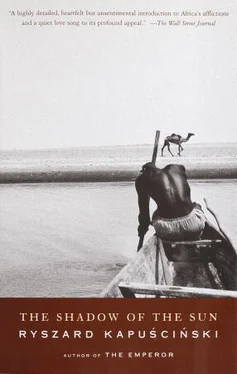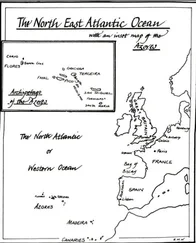“To Kumasi.”
Those who are hunting for passengers to Kumasi shake our hands and, bouncing with glee, lead us to the appropriate bus. They are happy, because, having found him a passenger, the bus driver will reward them with a banana or an orange.
We climb into the bus and sit down. At this point there is a risk of culture clash, of collision and conflict. It will undoubtedly occur if the passenger is a foreigner who doesn’t know Africa. Someone like that will start looking around, squirming, inquiring, “When will the bus leave?”
“What do you mean, when?” the astonished driver will reply. “It will leave when we find enough people to fill it up.”
The European and the African have an entirely different concept of time. In the European worldview, time exists outside man, exists objectively, and has measurable and linear characteristics. According to Newton, time is absolute: “Absolute, true, mathematical time of itself and from its own nature, it flows equably and without relation to anything external.” The European feels himself to be time’s slave, dependent on it, subject to it. To exist and function, he must observe its ironclad, inviolate laws, its inflexible principles and rules. He must heed deadlines, dates, days, and hours. He moves within the rigors of time and cannot exist outside them. They impose upon him their requirements and quotas. An unresolvable conflict exists between man and time, one that always ends with man’s defeat — time annihilates him.
Africans apprehend time differently. For them, it is a much looser concept, more open, elastic, subjective. It is man who influences time, its shape, course, and rhythm (man acting, of course, with the consent of gods and ancestors). Time is even something that man can create outright, for time is made manifest through events, and whether an event takes place or not depends, after all, on man alone. If two armies do not engage in a battle, then that battle will not occur (in other words, time will not have revealed its presence, will not have come into being).
Time appears as a result of our actions, and vanishes when we neglect or ignore it. It is something that springs to life under our influence, but falls into a state of hibernation, even nonexistence, if we do not direct our energy toward it. It is a subservient, passive essence, and, most importantly, one dependent on man.
The absolute opposite of time as it is understood in the European worldview.
In practical terms, this means that if you go to a village where a meeting is scheduled for the afternoon but find no one at the appointed spot, asking, “When will the meeting take place?” makes no sense. You know the answer: “It will take place when people come.”
Therefore the African who boards a bus sits down in a vacant seat, and immediately falls into a state in which he spends a great portion of his life: a benumbed waiting.
“These people have a fantastic talent for waiting!” an Englishman who has lived here for years tells me. “Talent, stamina, some peculiar kind of instinct.”
Africans believe that a mysterious energy circulates through the world, ebbing and flowing, and if it draws near and fills us up, it will give us the strength to set time into motion — something will start to happen. Until this occurs, however, one must wait; any other behavior is delusional and quixotic.
What does this dull waiting consist of? People know what to expect; therefore, they try to settle themselves in as comfortably as possible, in the best possible place. Sometimes they lie down, sometimes they sit on the ground, or on a stone, or squat. They stop talking. A waiting group is mute. It emits no sound. The body goes limp, droops, shrinks. The muscles relax. The neck stiffens, the head ceases to move. The person does not look around, does not observe anything, is not curious. Sometimes his eyes are closed — but not always. More frequently, they are open but appear unseeing, with no spark of life in them. I have observed for hours on end crowds of people in this state of inanimate waiting, a kind of profound physiological sleep: They do not eat, they do not drink, they do not urinate; they react neither to the mercilessly scorching sun, nor to the aggressive, voracious flies that cover their eyelids and lips.
What, in the meantime, is going on inside their heads?
I do not know. Are they thinking? Dreaming? Reminiscing? Making plans? Meditating? Traveling in the world beyond? It is difficult to say.
Finally, after two hours of waiting, the bus, now packed full, leaves the station. On the rough potholed road, shaken this way and that, the passengers come to life. Someone reaches for a biscuit, someone else peels a banana. People look around, wipe sweaty faces, neatly fold wet handkerchiefs. The driver is talking nonstop, holding the steering wheel with one hand, gesticulating with the other. Everyone keeps bursting out in laughter, the driver the loudest, the others more softly; perhaps they’re just doing it out of politeness, because they feel they should.
We’re on our way. My fellow passengers are only the second, perhaps even the first generation of Africans fortunate enough to be conveyed to their destinations. For thousands and thousands of years, Africa walked. People here did not have a concept of the wheel, and were unable to adopt it. They walked, they wandered, and whatever had to be transported they carried — on their backs, on their shoulders, and, most often, on their heads.
How is it that during the nineteenth century there were ships on lakes deep in the interior of the continent? They were first disassembled at oceanic ports, then carried piecemeal on people’s heads and put back together again on the shores of the lakes. Cities, factories, mining equipment, electrical plants, hospitals, all were carried in sections deep into Africa. All the products of nineteenth-century technology were transported into Africa’s interior on the heads of its inhabitants.
The people of northern Africa, even of the Sahara, were more fortunate in this respect: they could use a beast of burden, the camel. But neither the camel nor the horse was able to adapt to regions south of the Sahara — they perished, decimated by the encephalitis borne by the tsetse fly, as well as by other fatal diseases of the tropics.
The problem of Africa is the dissonance between the environment and the human being, between the immensity of African space (more than thirty million square kilometers!) and the defenseless, barefoot, wretched man who inhabits it. Whichever direction he turns, there is distance, emptiness, wilderness, boundlessness. Often one had to walk for hundreds, thousands of miles to encounter other people (to say “another human being” would be inappropriate, for a lone individual could not survive in these conditions). For the most part information, knowledge, technological innovation, goods, commodities, and the experiences of others did not penetrate here, could not find a way in. Exchange as a means of participating in world culture did not exist. If it appeared, it did so only accidentally, as a rare event, an exception. And without exchange there is no progress.
Most frequently, people lived in small groups, clans, tribes isolated and scattered over vast, hostile territories, in mortal peril from malaria, drought, heat, hunger.
Living and moving about in small groups allowed them to flee danger more easily and thereby survive. These peoples applied the same tactic once practiced by light cavalry on the European field of battle: the keys were mobility, the avoidance of head-on confrontation, the skirting and outsmarting of peril. As a consequence, the African was a man on the move. Even if he led a sedentary life in a village, he was also on the move, for periodically the entire village would set off: either the water had run out, or the soil had ceased to bear crops, or an epidemic had broken out, and off they would go, in search of succor, in the hope of finding something better. Only city life brought them a measure of stability.
Читать дальше












